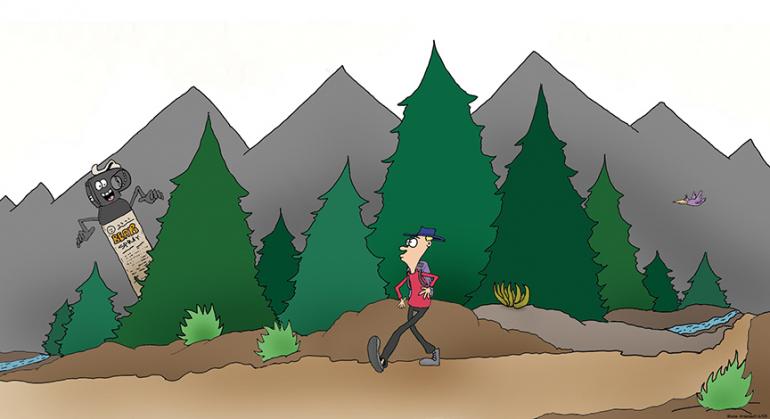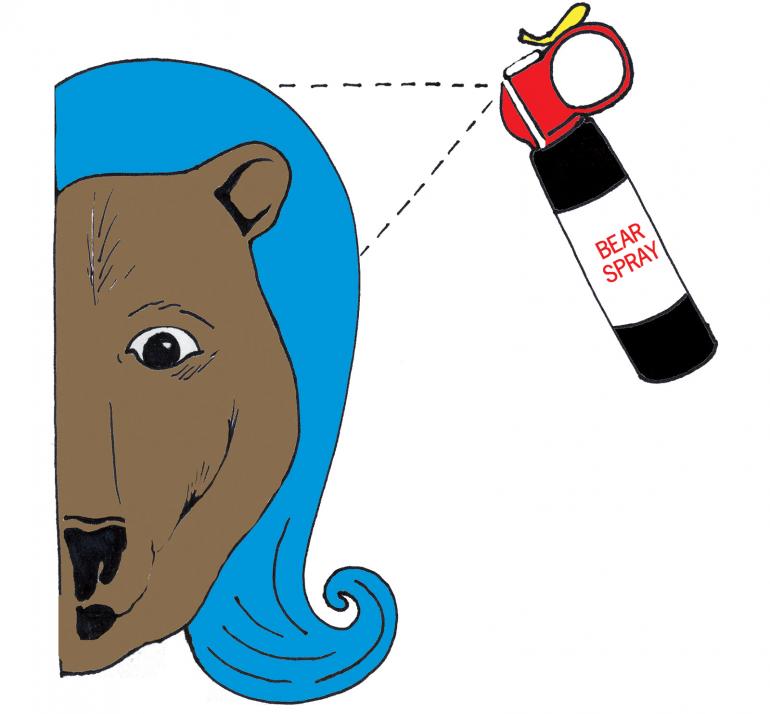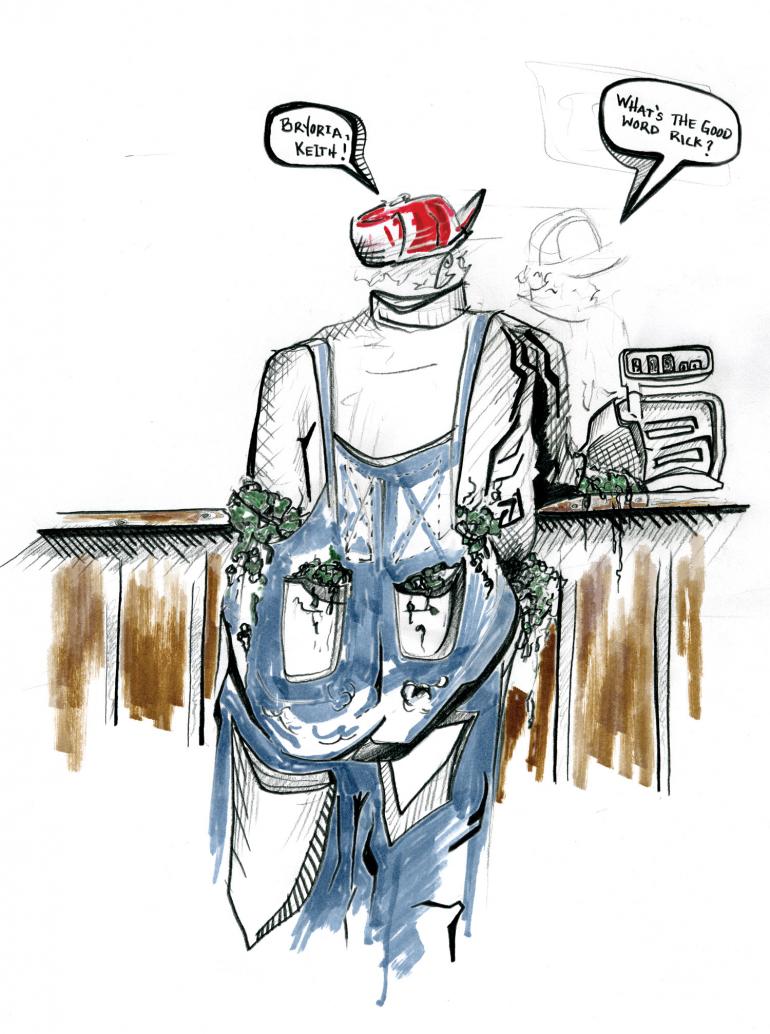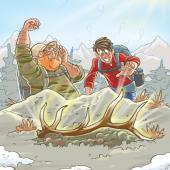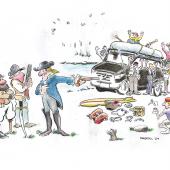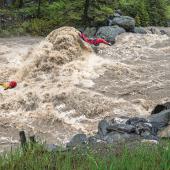Bear-Spray Stories
A series of self-inflicted wounds.
Every time I get sprayed, I have to laugh. It's like, how dumb can I get? I have been sprayed far more times than any bear I know of. I think something's bass-ackwards here.
In fact, I don't know that a grizzly bear's ever been sprayed where I live, in the Cabinet-Yaak ecosystem—one of the most vital geographic cornerstones of the grizzly's survival in the Lower 48, home now to only two or three dozen bears. They are so exquisitely rare, so imminently imperiled, that one's immediate response upon seeing one, on the most infrequent of occasions, should not be to discharge hot pepper spray at it, but to marvel in heartfelt awe at one's luck in catching such a glimpse. To even come across the tracks of a grizzly, up in this last corner of wilderness, last corner of history, is a spectacular event.
So perhaps I keep spraying myself with pepper spray out of some subconscious effort to harm myself, so troubled am I by the implicit disrespect, or even antagonism, of the act: carrying a loaded weapon into the territory of a shy, endangered creature who, if not necessarily a friend, is certainly no enemy.
My first experience with being sprayed happened way back in college, in northern Utah. I was sitting in a late-night diner on a date with a Mormon girl, and we were about to pay for our meals and leave. Her purse was open—she had gone to the restroom—and in the top of it was a tiny aerosol spray can of what I took to be breath-freshener. Having just finished off a plate of corned-beef hash, and anticipating the evening ahead, I picked up the little spray-can and squirted a stream of it into my mouth—expecting mint, or peppermint. Expecting romance.
What I got instead was the rough equivalent of a mule-kick to the face. I fell backward off my stool, shouting and retching as a kaleidoscope of pain blossomed gold-starred across my palate. A most memorable sight it must have been for my date when, returning from the restroom, she found her companion spinning clockwise on the floor, clawing at his face, his corned-beef hash spilled out in front of him. It felt as if my face were on fire, and I wished for nothing less than a miracle, that someone would pour a bucket of cold water over me.
Somehow I got to my feet and bulled my way blindly, careening against horrified onlookers, to the men's room, where I shoved my head in a sink and began dousing the flames. It was some time before the pain subsided enough for me to come back down to earth, and rest assured that when I came back out into the diner my date was gone.
I used to move through these woods like the wind, with no forethought of consequence or danger-sliding; instead, along the contours, bending this way and that through the bottoms of dark-night ravines without a flashlight, and galloping headlong atop windy ridges, unconcerned about anything, least of all bears. In 13 years of hiking these sawed-over hills, I've seen 12 grizzlies, and half of them have fled from me as if believing my sole intent in life, the reason I was in their woods, was to get them, while the other six merely sat down and studied me, sniffing the air with deeply troubled expressions, as if thinking, Well, there goes the neighborhood.
In all cases, I turned around and left the heart of their territory, a little embarrassed at having intruded upon so great and private a creature. I'm not sure at what point I decided to begin carrying the clunky holster of spray, nor am I even sure for what reason. There had always been rare and certain mornings when, before embarking on a hike into wild country, I'd get a brief feeling of uneasiness, and would, on those days enter the woods with more caution, more respect, rather than with the euphoria, the unthinking exuberance of the past.
But I'd had no truly life-threatening encounters. Lions had stalked me before, and a black bear had charged me—but the grizzlies, for whom the spray was designed and marketed, never. In addition to being cumbersome, the cans were expensive as hell, and seemed like nothing more than a shortcut to irresponsibility.
But as anyone who's a parent can attest, you slow down once you have children. You become deeply aware of how important it is to them that you stick around. Past extravagances seem extraordinarily foolish. I bought one of the spray-cans, and, on those days when I felt a bit of tension in the valley, or would be passing through or near places where I knew there were bears, I carried it. On my hip, it felt like a small fire extinguisher, and again, moving with it through the country of bears, I would often find myself feeling embarrassed, as if I had somehow betrayed them; or betrayed some implicit trust, some cautious understanding.
But it wasn't just for my family that I carried the spray into the woods now, on certain days, certain trips. It was, I told myself, for the bears themselves: to protect them from my own blunders and mistakes, should I be foolish or careless enough to wander into a situation that forced one of them to respond with aggression.
If a bear charged me, attacked me, injured me, it would be bad for that bear not from my own hand, but from the fears of others, who would say, we told you the woods were dangerous; and bad, then, for all bears, as in our species' unimaginative way we extrapolated immediately, totally, the justified actions of one to serve as the unjustified intent of all, and of perhaps also the intent of the dark harbor of the wilderness itself humans taking that one small and specific incident, a bear charge, and translating it onto the great abstract canvas of All, with our brutal penchant, our instinct, for stereotyping.
And think of this too, I tell myself: what better lesson to deliver to a bear that might find itself cornered into a position where it feels it must charge, than to receive a healthy dose, a snootful, of liquefied capsicum powder? Imagine the tremblings, the terror in that animal's poor heart, the next time, and every time thereafter, it scented a human entering its woods? Perhaps, by spraying the right bear at the right time, that bear might actually be saved. Perhaps, by such a defense, even the wild woods themselves might be saved; though even as I suggest these hypotheses to myself, I am aware of the vast faults in logic beneath them—as if crossing a sheet of crackling, soggy ice.
I think I carry the spray on certain days mostly because, for a number of reasons, I do not care to be killed and eaten, despite the romantic notion of the bear then taking my heart into his or hers: a rough and inefficient, though gloriously sublime, transfer of calories. (As an activist who's spent many years laboring on behalf of the last roadless landscapes, the public wildlands, which grizzlies and other wild things need desperately to survive, it has not gone unconsidered by me the humor, even delight, representatives of the various extractive industries seeking to liquidate those last wildlands would find in the irony of my being consumed by one of the things I professed to seek to defend; and from that awareness, too, I am careful, aware of nature's love of irony, fit, and counterbalance...)
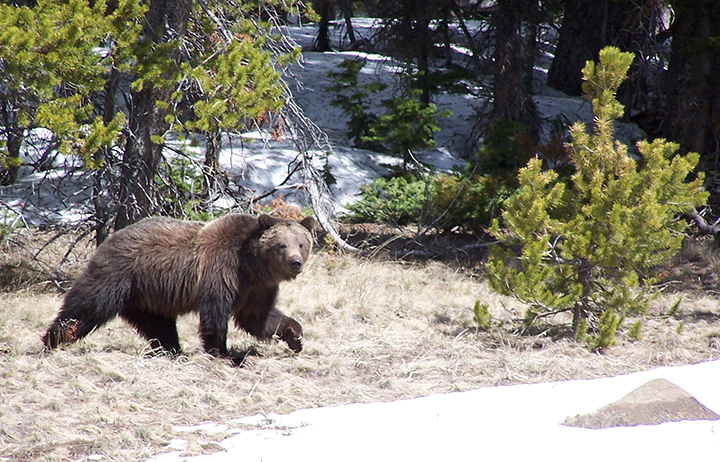
The second time I was sprayed was actually the first time I caught a dose of one of the big cans of bear spray. It was summertime, and I was out picking huckleberries with my young daughters. I'd seen bear scat in the area, but that wasn't unusual; you can't not find bear scat in a huckleberry field, and because of the patch's proximity to a road, I figured it was probably the sign of a black bear—that the grizzlies prefer, for the most part, the deeper, wilder, interiors of the forest—as far away from the activities of man as possible. Further, we scheduled our berry-picking during the heat of the day, when the bears, with their heavy coats, would be less likely to be out and about.
Still, I carried my spray; and because the bushes were high, we were sitting beneath them, swathed in leafy green light, our voices muffled as we plucked the sweet purple berries. I kept the holster open and had the orange safety-valve already popped off so that I could use the spray immediately, if necessary. I kept the girls close to me—no more than 10 paces at any time.
We had been picking for almost an hour and had fallen into that silent, peaceful, autumnal trance of the hunter-gatherer, when, on a steep hillside, I shifted my weight and, in crouching down, squeezed the trigger in the fold formed between my stomach and thigh.
I felt and heard a thunderous, intestinal gurgling down in that vicinity—a hissing sound as loud as if a tire had been gashed—and a moment later a red mushroom cloud of pepper-vapor erupted from beneath the denim of my overalls, and my thigh began to burn as if wasp-stung. I shot straight up, yowling, and by standing up the trigger mechanism was released so that the spray stopped.
That one wasn't so bad. The emission was localized, leaving a red spot roughly the size of a silver dollar atop my thigh, safely distanced from any tender membranes—though all in all, a close call.
The third time I was sprayed, it was my dog who got me, though still and again, as always, it was I who was responsible. The berry season was over, and Point and I had been out hunting grouse that afternoon, and I'd stopped off at the tavern briefly before heading home.
It was dark by that time, and Point was riding up front with me, as he always does. I guess he was hungry or something, because he hopped into the cab section of the truck and began nosing around in there. (Perhaps he was attracted to the scent of red pepper, as even the bears themselves are said to be drawn sometimes by curiosity.)
I don't know if I had left the safety-cap off or if Point dislodged it with his scrabbling. In any event, once again I heard that telltale squirting, spraying sound, and the cab of the truck was filled immediately with a cloud of red pepper. I barely had time to pull over to the side of the road before being overcome with stinging blindness and an involuntary, spasmodic attack of dry heaves.
With the car parked crookedly, driven half into the bushes, I bailed out of the cab as if fleeing a burning structure, and wobbled sightlessly in circles, coughing and gagging, hissing thin trickles of mad-dog drool, and trying to spit up, though nothing was in me to come out.
A neighbor came driving down the dark road, driving slowly—paused, evaluating the strange scene in his headlights—and then (doubtless shaking his head and clucking, believing I'd had a few too many at the tavern) eased on past, not wanting to intrude upon my evident misery.
There was a creek down in the woods below. I hurried down toward it in the darkness, pawing at my eyes and colliding with trees, crashing over saplings, my dog stumbling behind me, and we threw ourselves down into the cool, shallow water, and splashed it onto our faces. It was becoming slowly evident to me that it was not really the bears I had to worry about.
The fourth time was really a corker. My wife and I decided to take the girls on one last summer picnic, in the final week of August, before school started back up. The place I wanted to take them was a beautiful waterfall that could be reached after a long hike along the river through old-growth larch trees. A year ago, in that same drainage, a large male grizzly, one with whom the biologists were familiar and who weighed, they said, over 600 pounds, had bluff-charged a bow hunter who had stumbled onto him in some brush, from downwind, as the bear had been napping.
The cruising range for such a creature in these parts is probably around 500 square miles. And he was a good bear, a great bear: even in his summer ire, he'd only bluffed. There were more fistfights down at the bar last summer, more murders down in the little town of Kalispell, more lightning strikes, more anything, than there were bear problems in this valley last year. But still, I carried the spray: again. Passing through a marshy glen of alder, we found the fresh tracks of moose and bear—grizzly, big grizzly. I took the safety cap off my canister, and we proceeded, talking loudly.
Of course we did not see a bear (nor a moose, nor even a deer, talking as we were). But I did spray myself again, when I knelt down to re-tie a bootlace. I was wearing overalls, and this time the pepper spray mushroomed up inside me, a balloon of pain that had its unfortunate epicenter pretty much in my mid-groin region.
Once more I hit the river; but so saturated was my skin that I couldn't get it all scrubbed off. My overalls were saturated too, and my underwear were totaled, trashed, a dripping red wad of pepper spray. I had to take them off and stuff them into my backpack.
I rinsed my overalls in the river and was able to make the rest of the hike in a hunched-over limp—though any time the denim brushed against me, fore or aft, it set off a new surge of pain.
I couldn't just walk back home naked, in nothing but my hiking boots. So while the girls swam and picnicked, I gathered lichen and moss from the old forest and began stuffing it into my overalls like padding. By the time I had it spread enough so that no denim was touching me, it looked like I too weighed 600 pounds. Curls of black lichen protruded from the neck of my shirt and from beneath the sleeves of my t-shirt. Wisps of black tuft gathered around the tops of my boots on the walk home, and as I lurched hump-backed through the forest, pausing from time to time to readjust the shifting lichen, I'm sure I looked like nothing less than a werewolf—and it was both alarming and touching at how matter-of-factly my daughters accepted this strangeness.
I often wonder what random images from childhood my girls will take with them to remember, as adults, and as I hobbled along behind them that bright sunny day, stopping occasionally to pull down a new bundle of moss before stuffing it down into my overalls, I had the sinking feeling that this might be one of those memories, those indelible images.
By the time we stopped for gas at the mercantile, on our way home, I'd forgotten that I was stuffed with about 400 cubic centimeters of lichen. In fact, it was kind of comfortable. When I walked in to pay for the gas, however, I was reminded of it, when Keith informed me, with some concern, that my fly was open. Indeed it was, and sticking out from behind the overalls' buttons was a leaking mass of lichen. I pulled it free—there was a long spool of it in there—and thanked him, paid for my gas, and left. We respect each other's privacy, up here.
Spraying myself with my bear spray—hosing myself down with it—is minor league stuff, though evidence enough of an increasing clumsiness, a distraction, which may or may not be an appropriate way to enter bear country. (Part of me wants to caution myself, Wake up!; though at the same time another part of me wants to say, What are the woods for, if not a place to dream?)
We need every last bit of big wild country kept wild, for bears and other wild things. We need wild country for young people to be young in, and for older people to look at and remember, and, if they are still willing, to continue to enter it, with respect and caution—honoring quietness, honoring privacy: always mindful of the consequences of one's actions, and one's responsibilities as well as one's rights.
I carry bear spray with me sometimes now not as protection against the bear's or the lion's ferocity, but against my own foolishness. Someday I hope to be too old to be able to walk all over this valley, and when I am, I hope that there are still grizzly bears, wild grizzly bears, young grizzly bears, living as they have always lived, in those last far corners where we have not yet built roads or dams or mines.
The bears are not the danger, the wilderness is not the danger, nature is not the danger. We are the danger, and a world without these things, or with these things diminished—bears, wilderness, wild nature—is not a place I care to dwell. I am clumsy in that world, as well. It is not nature's fault that I stumble. It is in wild nature that I most feel such stumbling is all right—approaching, with my clumsiness sometimes, even a prayerful kind of grace, and laughing and marveling at the richness of a wilder, farther world that for the most part still lies beyond our touch, our reach, and even our understanding. We cannot really protect ourselves against such wonder. We can only protect ourselves against the vices of inattention and disrespect.
We need more big wild country, against which to be wonderfully, foolishly, human, while the rest of the animal world looks on, and perhaps marvels.
Rick Bass is the author of numerous works of fiction and non-fiction. This essay is adapted from a longer version that appeared in OnEarth, the quarterly journal of the Natural Resources Defense Council.


